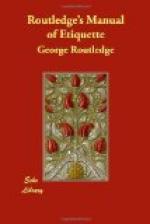Returning Visits.
The bride and her husband, or, in case he may not be able to attend her, the principal bridesmaid—the last of whose official duties this is—usually return all the wedding visits paid to them. Those who may have called on the bride without having received wedding cards should not have their visits returned, unless special reason exists to the contrary, such visit being deemed an impolite intrusion.
These return visits having been paid, the happy pair cease to be spoken of as bride and bridegroom, but are henceforward styled the “newly-married couple;” and then all goes on as if they had been married twenty years.
* * * * *
VII.—PRACTICAL ADVICE TO A NEWLY-MARRIED COUPLE.
Our advice to the husband will be brief. Let him have up concealments from his wife, but remember that their interests are mutual; that, as she must suffer the pains of every loss, as well as share the advantages of every success, in his career in life, she has therefore a right to know the risks she may be made to undergo. We do not say that it is necessary, or advisable, or even fair, to harass a wife’s mind with the details of business; but where a change of circumstances—not for the better—is anticipated or risked, let her by all means be made acquainted with the fact in good time. Many a kind husband almost breaks his young wife’s fond heart by an alteration in his manner, which she cannot but detect, but from ignorance of the cause very probably attributes to a wrong motive; while he, poor fellow, all the while out of pure tenderness, is endeavouring to conceal from her tidings—which must come out at last—of ruined hopes or failure in speculation; whereas, had she but known the danger beforehand, she would have alleviated his fears on her account, and by cheerful resignation have taken out half the sting of his disappointment. Let no man think lightly of the opinion of his wife in times of difficulty. Women have generally more acuteness of perception than men; and in moments of peril, or in circumstances that involve a crisis or turning-point in life, they have usually more resolution and greater instinctive judgment.
We recommend that every husband from the first should make his wife an allowance for ordinary household expenses—which he should pay weekly or monthly—and for the expenditure of which he should not, unless for some urgent reason, call her to account. A tolerably sure guide in estimating the amount of this item, which does not include rent, taxes, servants’ wages, coals, or candles, &c., is to remember that in a small middle-class family, not exceeding four, the expense of each person for ordinary food amounts to fifteen shillings weekly; beyond that number, to ten shillings weekly for each extra person, servant or otherwise. This estimate does not, of course, provide for wine or food of a luxurious kind. The largest establishment, indeed, may be safely calculated on the same scale.




